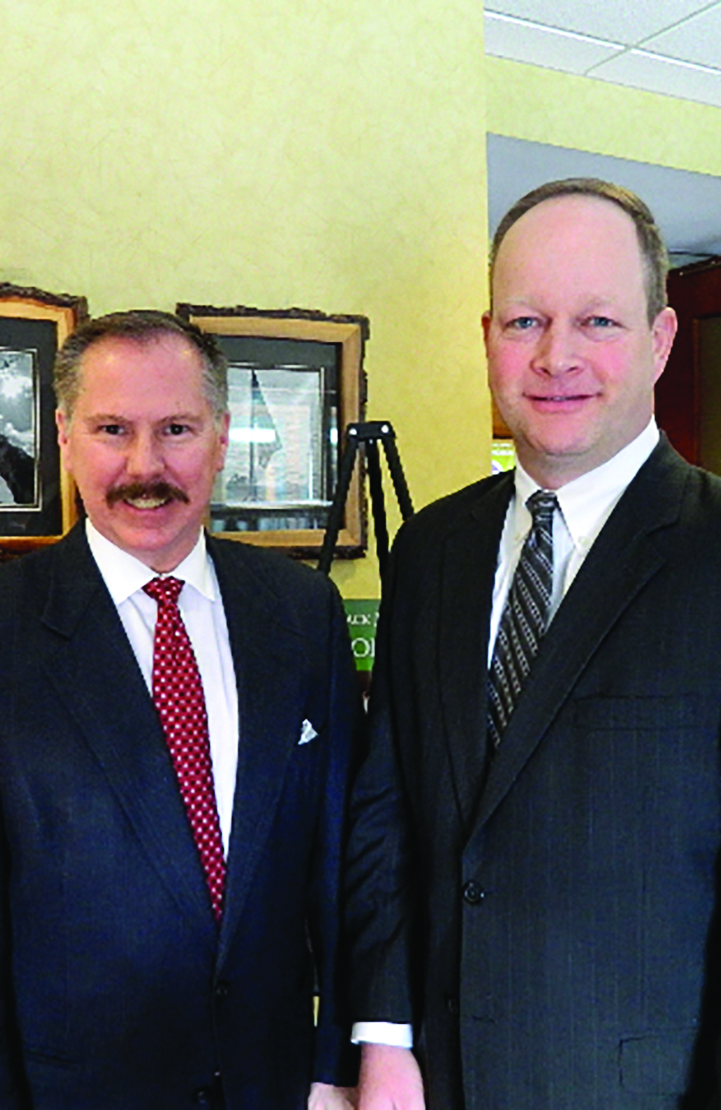
BY LISA BALSCHUNAT
Geoffrey O’Hara, executive director, Eastern
Region, U.S. Chamber of Commerce, discussed
an uptick in U.S. economic growth in our country,
while drawing attention to the issues that
must be addressed in 2015 at the Adirondack
Regional Chamber of Commerce’s annual business
forecast luncheon recently.
O’Hara spoke to some 150 people the event,
held at Six Flags Great Escape Lodge in Lake
George.
“The state of American business is strong,”
O’Hara stated. “Six years after the end of the recession
there is growth in investment, inflation
is low and there is no recession on the horizon.”
He said while the European Union, Asia and
China “are dealing with economic struggles,
and we are experiencing economic growth.”
But with 17.7 million people unemployed or
underemployed “there is work to be done” on
many levels, he said.
For the first time in U.S. Chamber of Commerce
history, the Chamber, was heavily
engaged in mid-term elections because the
governing bodies in Washington D.C. needed to
clearly hear the voice of commerce, O’Hara said.
“We were involved in primary elections in
the south … We were heavily engaged in midterm
elections in several states and were also
involved in New York 21,” he said.
O’Hara keyed in on four opportunities for
credible commerce in the coming year: trade,
energy, technology and infrastructure.
He said “95 percent of consumers lives
outside the U.S.” and that President Obama
has two important trade agreements before
him–the Trans-Pacific Partnership and the
Trans-Atlantic Partnership–that also require
a Congressional vote through the Trade Promotion
Authority. He said “2.5 billion jobs in the
U.S. rely on exports. There is a huge growth
opportunity here. The House, the Senate and
the U.S. Chamber businesses all want it.”
Regarding energy, he said the U.S. has an
abundant amount that can contribute to economic
growth.
“Hydrolic fracturing (fracking) is underway
in Pennsylvania and West Virginia … It is the position
of the U.S. Chamber of Commerce that we
have to capture new energy, make it affordable,
harness a safe supply, and we have to develop
opportunities to export it around the world.”
Technology continues to be important to
economic growth.
“New centers for technological innovation
will help U.S. businesses sustain and surpass
state-of-the-art levels of excellence,” he said,
adding that there are 2.7 billion people employed
in Information Technology positions,
with 37 percent of them in New York state.
He said it is the responsibility of the Global
Intellectual Property Center of Homeland Security
to strike a balance between security and
commerce flow at both our geographic borders
and virtual ones.
O’Hara discussed infrastructure and the
federal Highway Trust Fund, set to expire in
May. He said it is important “to move commerce
and people safely throughout our country,” and
roads and highways. “We are never pro-tax at
the U.S. Chamber, but our roads, bridges and
highways need attention. It requires investment
and it sustains jobs.”
Taking questions from the audience, O’Hara
said that U.S. colleges and universities are lowering
the incentives for international students
to stay in the country after they obtain degrees
in the U.S. because they have to wait to get a
Visa to stay in the country. As a result, many
highly skilled college graduates are taking their
expertise elsewhere. He said some sort of Visa
reform is important.
He said conversely, “farmers in California
and New York can’t find U.S. workers who
want to pick lettuce all summer, for example,
and those jobs are then backfilled with foreign
workers.”
O’Hara said he seeks to expand the Chamber’s
Eastern Region operations and strengthen
relationships with Chamber members businesses,
associations, and chambers of commerce.
He said partnerships, like the one the
eastern regional office has with the ARCC and
other chambers in the region is critical.
“Collectively we have a larger global reach.
We can share our business with the world,”
he said. “Our investments in the inventions
that are surfacing in a garage, dorm room or
at kitchen table in our country can launch a
new business expand exponentially. And with
a larger global reach good things happen.
Employment opportunities arise. Charitable
giving increases. People feel good about their
employment, and communities benefit overall.”
O’Hara is responsible for legislative and
political grassroots strategy in 11 states in the
eastern region including New York, New Jersey,
Maryland, Delaware, Virginia and the six New
England states.
Photo by Lisa Balschunat
